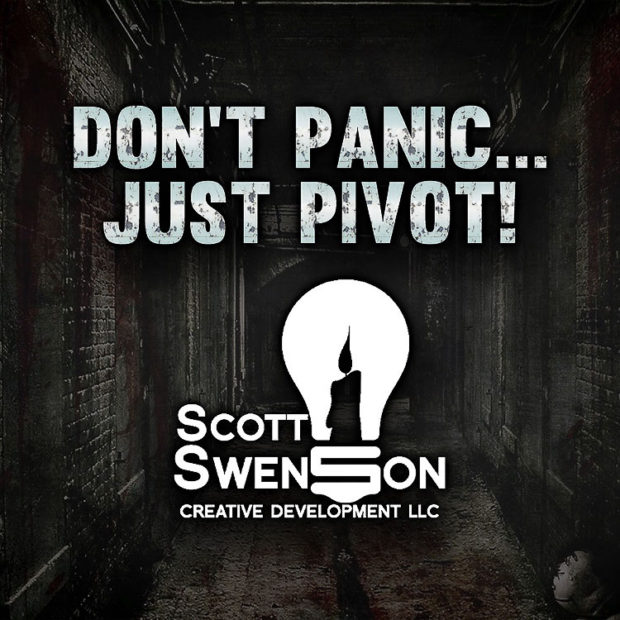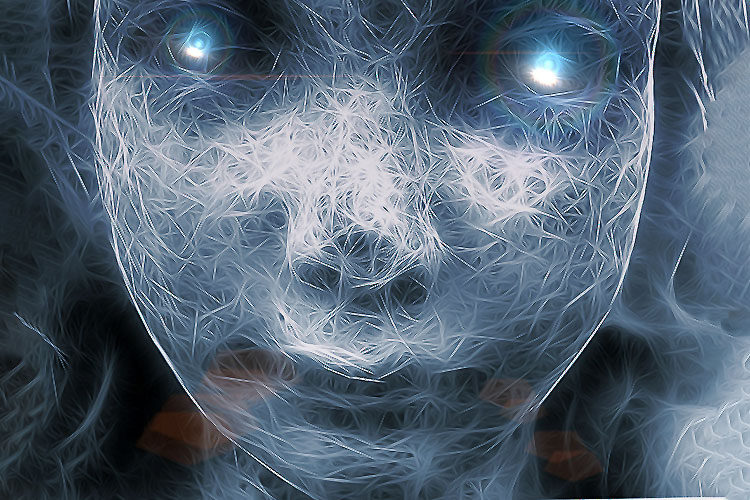Creative strategies for haunts and haunters to move through the COVID-19 pandemic and emerge on their feet.
by Scott Swenson
Episode 42 of my podcast, A Scott in the Dark inspired this post. Let me be 100% honest. I had no intention of recording this episode, but inspiration hit and hit hard, and Episode 42 was the result.
I had the amazing opportunity to moderate three panels as part of the Virtually Prepared online weekend event that happened on March 28 and 29, 2020. In listening to these industry professionals, the message came through loud and clear: We must rethink the way we do business, because the old ways are changing. This has happened twice in my lifetime—during the HIV/AIDS scenario in the mid- to late 1980s and also after 9-11. Covid-19 is another reset moment.
Listen to the Podcast
“Don’t Panic, Pivot”
While moderating three panels, I used the phrase, “Don’t panic, pivot” a few times. The term affected people, so much so I’m now a meme. I’ve never been a meme before, and I’m very proud of that and my big-boy self in my own twisted little way.

I started thinking more about that phrase and what it means. I was thinking about many of my friends who, because of COVID-19, are out of work, furloughed, or have reduced pay or reduced hours. There are a bunch of things that have happened—I don’t want to say unexpectedly, but, you know, no one expects the Spanish inquisition, and no one expects COVID-19. I care about how this is affecting people and how it will change the way the world—especially the world of entertainment—does business.
The day before I recorded this episode, they announced that SeaWorld Parks and Entertainment was furloughing 90% of its employees. That’s a very scary thing for people—no paycheck, no insurance coverage. There are many people living paycheck to paycheck. The bottom line is, there are people that I care about who are having challenges right now—including myself.
Mark Cuban said on CNBC “how companies respond to [returning staff to work] will define their brand for decades. If you rushed in and somebody got sick, you were that company. If you didn’t take care of your employees or stakeholders and put them first, you were that company.” Don’t bring everybody back to work too soon and become the company that made everyone ill because one or more employees was a carrier of COVID-19.
Many of us might feel helpless. What do we do now? I’m talking to haunters and people in the seasonal entertainment industry, but I think “Don’t panic, pivot,” applies to a much broader audience. I’m talking about hitting the reboot. When your computer is acting up, we reboot and start over. That’s how I view what we need to do now.

Think Different
I hear people say, “Once everything gets back to normal…” I don’t see it getting “back to normal.” We’re hurtling to a new normal, and we must recognize, accept, and embrace that.
Nobody knows what the new normal looks like yet. It will be a process to get to that new normal, and we have to figure out how we recover from the devastation and how we make sure it doesn’t happen again.
Soapbox warning. This pandemic reinforced what our teachers told us in kindergarten: Wash your hands, keep your hands to yourself, and don’t pick your nose or touch your face. No one is asking us to put on a hazmat suit every time we go out. It’s less human-to-human contact. After this is over, we must continue to do the smart things: wash our hands frequently and keep our hands to ourselves.
For years I had a giant poster on my wall I got from Apple Computer. It featured a black-and-white photograph of Jim Henson and Kermit, and it said, “Think different.” Now, even though it was grammatically incorrect, thinking different is something that’s inspired me forever. This is what I’m talking about when I say don’t panic, pivot. Take the energy you’ve put into worrying about what will happen, what hasn’t happened, and what the government will/won’t do and focus it into how you can pivot what’s going on in your life now.
That redirection may involve taking advantage of some of the government programs being offered. It may be making certain that you file for unemployment. It may be applying for jobs. I’m not saying we shouldn’t think about the practicality of it. But, for our own sanity, for our own professionalism, and if you’re a creative person like I am, you’ve got to give yourself some purpose, some focus, and you can’t do this in the old way. We all wish this pandemic hadn’t happened, but we can’t control that. However, we can control our attitude and our actions.

Identify Your “Must Haves”
The concept of “don’t panic, pivot,” has different levels. First, look at your life to see if there are alternative ways of doing things. Are there new ways of accomplishing what you need to accomplish? Considering this from a business standpoint, define your “must haves.”
When completing this exercise by yourself or with your team, identify what you must have now, not what you thought you had to have before. Be realistic and honest about what you need based on where you are now.
For example, when I was a supervisor at Busch Gardens in Tampa. I did the schedules for the strolling street performers, and there were only between five and eight of us. We covered different shows, and we all had their own special needs and requests. There were certain shows a performer couldn’t do if they were doing a particular show, but they might do afternoons. There were a lot of variables. When I was figuring out these schedules, I’d start by plugging in the must haves. Employee A and employee B requested certain days off. Employee C was a part-timer and only worked three days a week. I’d plug in the days off, the specific shows that people had to do, and fill in everything around those.
Reassessing your ‘must haves’ while to pivoting isn’t easy. It means you must let go of things you thought were essential and ask yourself if they’re still essential. For example, one of those must haves in the new normal might be hand sanitizer. Identifying those challenges and those must haves that address whatever the new normal will be for you and your organization is essential for being able to pivot.
Look Backward as You Move Forward
My next suggestion is to look backward, and not only forward. Were there ways you used to do things that stopped working because something changed but might be more useful looking forward? Never use the excuse, “We tried that before, and it didn’t work well.” Things will differ greatly from now on. There is no conventional wisdom anymore. There’s a possibility the entertainment industry will dry up for three years, because people will be scared to come out. There’s also an equally valid possibility that people will feel it’s safe enough to come out and gather again, and there will be tremendous boom in the industry.
We may need to look at how we used to do certain things—reservations, for example. Timed ticketing came up several times in the panels, and I’ve seen it posted on social media. Timed ticketing is a splendid way to control crowds and control the number of people in your haunted attraction.

Use What You Have on Hand to Create Your Haunt
Rethink the tenets of what a haunt has and how it’s done. One of our must haves might be that we can’t have anything that touches guests’ faces. That may mean putting the claustrophobia tunnel away for a while.
Let me tell you about a situation I had years ago when I was working at Howl-O-Scream at Busch Gardens in Tampa. As with all events, Howl-O-Scream ebbed and flowed in its popularity and its financial growth from year to year. In this year, there had been an ebb the year before, so management decided that the event would reduce its upfront spend, but they wanted the same quality and size as previously. My team laughed and said this wasn’t possible. I said, “Wait a minute. Let’s make a concerted effort here. Let’s not talk about what we can’t do, let’s talk about what we can do.” We made the whole park a scare zone rather than having individual scare zones. Zombie movies and zombie graphic novels were very popular at that time, so, instead of doing individual scare zones or outdoor areas within the theme park, we took all of that labor, reduced it slightly, and created these roaming hordes of zombies throughout the park. In that way, we turned the entire park into a scare zone. We even changed the announcements within the park to alert guests that zombies had taken over.
We also had to create a new haunted house with that reduced, upfront spend. I sat down with a brilliant man and dear friend, Claude Smith, and we decided to go to our warehouse, look at the assets we had in there, and figure out how we could slap them together into something that made sense. That’s how we created the Zombie Containment Unit attraction. We did invest some money in laser-tag rifles, but all of the scenic came out of the warehouse. We came up with a story that tied all these pieces together. The Zombie Containment Unit was set in a recycling plant, and we found ways to utilize what we had to meet our new criteria.
We’re in the same situation now. We need to reevaluate based on the time that some of us are losing over the summer to install. Hopefully, independent haunts, home haunts, are out there building all of their stuff now, because your day job isn’t pulling you away from it. Maybe you’re learning something new about a ticketing system or a new marketing system.

Build Your Brand Now
Take this time to make your brand an everyday word. Reach out to your guests, but not only to say, “We’re still here.” Provide fun stuff on your website or on social media right now. This is what theme parks, zoos, and aquariums are doing. For example, the Florida Aquarium in Tampa has online programming at 10:00 AM every day or every other day. Because the staff have to be there to take care of the animals anyway, they’re sharing what they do with guests to help them remember the cool things about the aquarium. We need to do that with our haunts as well. Continue to keep that brand awareness going, and not just to generate revenue. It’s marketing time now, folks, so get out there and make sure you’re doing that. That’s a new way of thinking. It’s a pivot. Usually, we don’t think about marketing until August, but, this year, we need to start doing it immediately. Now is the time to focus on that and make your clientele feel special and let them know you haven’t forgotten them. They’re going through this pandemic as well, so use that as a way to connect.
Pivot Your Business Model
Another way to address the new normal is to pivot your business model. To do this, you have to look at your short-term and long-term goals. Short-term goals may or may not contribute to the long-term goals. Short-term goals are what you’ll be working toward for the next two months. Once they’re accomplished, you’ll move on. These will be different based on the nature of your attraction, but there are certain goals that will be the same for all of us. For example, now is the time to build relationships. If you’re a vendor, now is the time to sell a product.
A key point that came up in the vendor panel on Virtually Prepared was that vendors and customers need each other to survive. So, if you’re a vendor, reach out and try to help your clients. Reach out and find ways to help them that you don’t get paid for, so when they have the money to buy whatever it is you sell, you’re the first person they call.
In the same way, if you’re a customer with a limited budget, don’t be afraid to talk to your usual vendors. There weren’t any trade shows this year, because they were all canceled. However, some vendors have online trade shows that are offering “show specials.” Vendors need customers, especially since they weren’t able to attend trade shows, so ask them if they can offer you a deal. The absolute worst thing they will say is no. If you reach out, you can create a win-win scenario. This is another way of pivoting your business model.
Taking the time to build relationships right now is essential, because we’re all going to need help. If you’re looking at a sponsorship for your haunt, now is the time to reach out to the pizza place or the soda distributor and discuss how you can work together during the new normal. So, build those relationships, because we may have to pivot two or three times before we land.

Pivot to a New Career
Another thing that you may need to pivot is your career choice, because the moment jobs start being posted online again, 10,000 people will be applying for each one. So, you may decide that you need to change your career. If you will do that, here are a couple of things to consider: Based on what the new normal is, determine what’s needed, and then look at the skills you have that fit those needs.
This is how new jobs are created. A perfect example is the life coach. When I was a kid, there was no such thing as a life coach. When I was a kid, you talked to your friends. Now, a life coach is a valid career choice, if you take it seriously and are able to help people. Again, it’s a job that came out of need. We’re discovering right now that things like Zoom are essential. There was a need, and they had the assets and programming to make that happen. I know Zoom started before COVID-19, but I was never required by a client to attend a Zoom meeting prior to the pandemic. We’d either communicated by phone or face to face. Now that we’re doing meetings virtually, Zoom has becoming the new normal.
Maybe my next career will be as a Zoom facilitator, since people told me I did a great job as moderator during the Virtually Engaged panels. That’s a skill set that may be worth something to large corporations. So, if there’s anybody out there who doesn’t like to run their Zoom meetings, contact me. I have the time. That may sound like a silly example, but even the silliest examples can become the most profound jobs.
Everybody who’s been in the haunted attraction industry has had to sell their haunted attraction at some time or another. I don’t mean “sell” as in, “Please buy my attraction, because I’m going under.” I mean, sell as in making certain people know how cool your attraction is, how scary it is, how important it is. So, you might want to focus some energy on whether it’s time to move into a sales career, a real estate career, or a human resources career. Let’s face it, if you’ve ever worked at haunted attraction in a theme park, you can handle customer relations like nobody’s business. One moment, you’re handling an irate actor who somebody accidentally punched in the face as they were going through the haunt, and in the next moment, you’re handling a drunk college guy. Fifteen minutes later, you’re dealing with a 12-year-old who’s terrified and wants to leave. We in the haunted attractions biz learn how to handle customers quickly, calmly, and, usually, effectively.
Don’t be afraid to consider leaving the entertainment industry and pivoting to a sales-based job, if that’s what your current needs and talents are pushing you toward. You can always do haunting as a hobby, and very little is permanent these days. So, just be willing to make those kinds of decisions based on your needs and those of your family.

Pivot Your Mindset
The most important thing we can do is pivot our mindset. We have to shift why we do what we do. As a consultant, I’m constantly looking at how I monetize what I do. I don’t want to give away my skills, and I believe professionals should be paid. I think creatives who write should be paid, just like I think actors, musicians, scenic designers, lighting designers, and costume designers should be compensated for the work they do. That being said, in our current environment, I haven’t stopped working, but I’m not getting paid as much for it. I know there are those out there who would argue and say, “Well, Scott, if you continue to give it away, you’re undervaluing what you do.” My view is that I’m building relationships and showing people what I can do, so, when the time comes and they’re ready to do something I can help with, I’ll be their first choice.
Let me give you a specific example. All theater companies are hurting, because they’ve had to close their doors, and that will continue indefinitely. Some of them are starting to do live streaming shows. I’m currently in negotiations with one of these theater companies to do a live streaming, one-man show that I started doing last year at a fringe festival. I’m going to do it as a benefit for this theater company. I won’t earn a dime, but I promise you that the next time the artistic director of this theater company needs something that I can do for them, I’ll at least have a foot in the door. Even these podcasts take time to plan, edit, and record, and they generate zero revenue. I’m okay with that, because it keeps me working, it keeps me focused, and it makes me feel I’m continuing to contribute and grow my skillset, which will make me far more viable to people who want to hire me. Even in a corporate environment, I used to say, “Do the job you want to do, and eventually someone will start paying you for it.” I moved up quickly in the theme-park industry, and I was able to become an independent contractor and immediately have clients because I’d built and shown my worth. So, I still have clients that pay me, and I’m working on specific projects that were in line before, but I have other projects that have been postponed or canceled. I know everybody in the industry has had that happen.
Think differently. Figure out what will be right for you, what you want to do, and what you can do. People say, “I don’t want to work for free for the rest of my life.” That’s the joy about pivoting: you can always pivot back. If you think about a pivot, it has a central fulcrum, a focal point, and everything turns around it. As long as you stay grounded in the middle, you can pivot this way for a while, and then you can pivot back.
Changes, even really big ones, are temporary. I don’t talk about this much anymore, but I went through a major, major change when I left the corporate world, when I stopped working at a theme park, because my position was eliminated. I pivoted within three days to realize I wanted to work for myself. At the time, I thought I’d do that for maybe a year or two, and then I’d want to go work for another company. That was six years ago, and I still haven’t found a company I want to commit to full-time. Right now, the company I’m committed to full time is the company I own.

When Things Change, Pivot Your Mindset
I though working in a theme park would be a life choice. After 22 years, I thought that was where I would retire. When that went away, I could have shut down. But, I didn’t. I pivoted, and this pandemic is an opportunity for you to do the same thing. Yes, there are different factors involved, but we need exactly the same mindset.
By taking control, you feel better, you continue to move forward. I’d say very few haunters do what they do because they want to become a multimillionaire haunted-attraction owner. That will not happen. You do it because you love it. Don’t let the fact that the world is changing take that away from you. Do what you love in a way that allows you to continue to do what you love. Make it sustainable for you. If that means having a day job and being a haunt actor or building scenic or applying makeup or taking tickets or whatever at a haunted attraction at night, do it. If you can sustain yourself by making haunting your full-time job, great. Be flexible, because that’s the only way to keep our sanity.
In closing, my heart goes out to all of us who must readjust. There are many people out there who are offering alternatives. Be open to them. The world isn’t going back to the way it was. You can mourn its loss for about 20 minutes, and then move on and recognize that this is a whole new opportunity. This gives us a chance to think about things differently. It gives us the chance to not panic but to pivot.